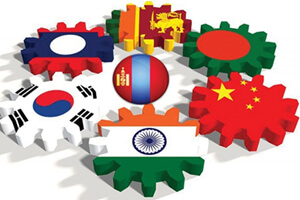Why Cloves Are So Expensive
Narrator: In the forests of South India, harvesters climb trees as tall as 50 feet to handpick these clove buds. When exported, less than half a pound of these dried cloves costs $30. That’s 10 times as much as some cumin. But as they focus on keeping their balance, harvesters must also be careful not to break the buds. If they do, the value of the clove drops significantly, and that’s just where the risk begins. To harvest cloves correctly, workers put their lives on the line. So what makes cloves worth the risks? And why are they so expensive?
Cloves are the flower buds of clove trees that haven’t blossomed yet. When dried, they’re commonly used as a spice. A clove’s flavor is complex, with notes of sweetness, bitterness, and heat. The oil found in cloves has medicinal properties that make the spice valuable outside of just cooking. Cloves with the round head, or crown, still intact have the most oil. But to get cloves with the highest possible oil content, highly skilled workers are needed at every stage.
Charles Simpson: Clove harvesting is a very big job. It’s a very risky job. So we have to get special people to do that.
Narrator: To get to the top of the trees, harvesters like Shibu rely on only a ladder and some rope.
Shibu: In order to secure this ladder, we have to tie it with three ropes on three sides.
Narrator: He reinforces the bottom of the ladder with mud, so it doesn’t move as he navigates the tall tree. Shibu ties a sack to his waist, and then he starts his climb, working his way from the top of the tree to the bottom.
Harvesters can’t pick too soon or too late, or the cloves will drop in grade and value. In addition to picking at the exact right time and being careful not to harm the clove bud, they need to be sure not to break the tree branches they climb. Otherwise, the tree will have a lower yield next harvesting season.
Navigating all these elements can be extremely dangerous. In Blackrock Estates, harvesting cloves has led to death.
Charles Simpson: A couple of years back, we lost a worker who, while he was plucking, the lightning struck him. We lost almost about six of them. They had paralyzed. We had to take them, rush them down to the hospital, and they were admitted for a month.
Narrator: Yet handpicking is the only way farms like Blackrock Estate have managed to keep delivering quality cloves.
Because timing is crucial, Charles needs a big team to pick the cloves as soon as they’re ready, which is usually mid to late February. Charles can sell the cloves for their highest price in the first 25 days of the harvesting season. The more he can harvest during this time, the better it is for business.
Charles Simpson: When the clove season is fully on, when we have a very good crop, we get about, nearly about 300 workers.
Narrator: During peak harvesting season, these workers make around $30 a day on average. Once the clove clusters are picked, harvesters carefully remove the individual buds from the stalks and leaves. They sift and sort each bud according to its size, age, and whether it has a top. It’s best if the circular crown of the clove, where it would otherwise flower, is still intact. This improves the spice’s taste and aroma. Even though there are machines to help with this process, Charles prefers to pay for it to be done by hand to lower the risk of clove damage.
Charles Simpson: They have clove breaking and sorting with machinery, but still, half the cloves is damaged in that. We get broken cloves in that. So it’s not very good doing it with a machine.
Narrator: The highest-quality cloves were picked at the right time, just before they turned pink or flowered. They’re large and plump and still have the crown. Second-quality cloves also still have their tops, but they’re smaller. They were either picked too early or too late. And the third quality has no crown, with the top having either flowered or broken off.
After the sorting, workers leave the cloves out to dry in the sun. High-quality cloves take three days to dry under good sunlight.
But a quality clove won’t always get sold as the highest grade, because official grading doesn’t happen until after it’s dry. If there’s too little or too much sun, the clove’s quality drops. Instead of golden brown, it becomes black, and it loses one of its most valuable properties, its oil content. First-quality cloves are the most fragrant and have the highest oil content. The headless third-quality cloves have the least.
And the difference shows in the price. Charles sells his first-quality cloves for about $10 a kilogram and his lowest grade for under $7.
Clove oil is mostly made up of the compound eugenol, which is not only responsible for the clove’s familiar aroma, but also for its medicinal benefits. Researchers have noted eugenol has antimicrobial, anti-inflammatory, pain-relieving, and antioxidant properties. So the demand for cloves goes beyond their culinary uses.
Cloves are so sought after in India that Charles is able to sell more than just the buds.
Charles Simpson: We sell everything. Nothing goes to waste. Even the pollen, the dust – everything we sell.
Narrator: That’s also because the cloves he grows, Kanniyakumari cloves, are known for their high oil content and strong aroma. In fact, these cloves were awarded a GI indication in 2021. Charles says Kanniyakumari cloves are the most expensive variety in India.
Charles Simpson: When you go to the market to buy cloves, the clove price will be about three times the price of what we give. It’ll be about 2,000 rupees [around $26], where we get only 750 [around $10].
Narrator: The retail price is so much higher because of the supply chain. To maximize on profits for the farm, Charles won’t sell his cloves directly to consumers, who only buy smaller amounts as needed. Instead, he sells to clove dealers, who buy large quantities. Dealers like Franklin Roosevelt then have to keep the cloves fresh until they sell them to retailers. If he doesn’t store the cloves properly, their shelf life drops.
Franklin Roosevelt: Clove has a certain temperature it must be stored at. They are always stored in cold storage. Otherwise, they will go bad and their taste will change.
Narrator: To cover the cost of quality control, Franklin sells cloves to stores for almost $12 a kilo. The shops that buy from Franklin have to pay transportation and packaging costs, bringing the retail price of cloves in India even higher.
But one of the biggest challenges in every step of the supply chain has been the changing climate.
Charles Simpson: Unseasonal rain causes the clove buds to fall off the tree. This causes a big loss to the estate owners, everything alternate year. Dealers and traders also face heavy losses. If I have taken an estate lease, I will still have to pay the labor.
Narrator: Between 2018 and 2019, India lost 13 metric tons of cloves due to heavy rainfall. And while the global clove market is expected to grow by 3.5% by 2027, the changing climate may still continue to disproportionately burden clove farmers.
Charles Simpson: I think it is not that profitable for the clove farmers anymore due to climate change. They have not been getting very good returns on investment lately. Things are better in the trading line. But then trading is not everyone’s cup of tea, as it involves a lot of risk. The more risk you take, the higher the returns are.















